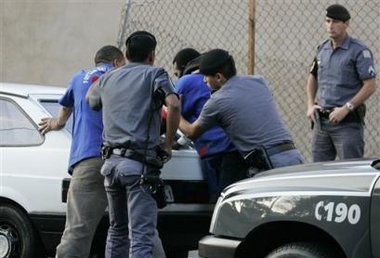A notorious criminal gang unleashed a second wave of attacks against police
Sunday, bringing to at least 52 the number of people killed in what one official
said was the deadliest assault of its kind in Brazil's history.

Police officers frisk men suspected of recent
gang attacks in downtown Sao Paulo, Brazil, Sunday, May 14, 2006. A
notorious criminal gang unleashed a second wave of attacks on police
Sunday, bringing to 52 the number of people killed in the deadliest
assault of its kind in the history of Brazil's largest state, authorities
said. [AP] |
Meanwhile, another 33 related prison rebellions also broke out on Sunday,
bringing the number of uprisings across Sao Paulo state to 51 ¡ª more than
one-third of Brazil's 144 prisons. Inmates were holding 244 prison guards
hostage.
The rebellious inmates have not made any demands nor have they harmed any of
their hostages, said Jorge de Souza a spokesman for the Sao Paulo Prison Affairs
Department.
He said visiting relatives were inside several of the prisons but "we don't
consider them hostages because they are there to show solidarity with their
jailed relatives."
Enio Lucciola, spokesman for the Sao Paulo State Public Safety Department
said the attacks and prison rebellions, planned by the First Capital Command,
known by its Portuguese initials PCC, "were the most vicious and deadliest
attacks on public security forces that have ever taken place in Brazil."
The attacks were in response to the transfer of eight imprisoned PCC leaders,
a practice authorities use to sever prisoners' ties to gang members outside
prison.
Lucciola said authorities were prepared for some kind of PCC attack after the
transfer "but we never imagined it would be so big or ferocious."
The press office of the Sao Paulo state government said the PCC carried out
at least 100 separate attacks on Friday, Saturday and Sunday that killed at
least 35 police officers, the girlfriend of one of them and two passers-by.
Fourteen suspected gang members were killed in gunbattles with police.
At least 72 people were arrested, "all of them with long criminal records,"
Lucciola said.
Officers set up checkpoints to search vehicles, and barriers were placed in
front of many police stations to block pedestrians and vehicles. TV footage
showed bullet-riddled police cars and shattered glass at one station.
Assailants also attacked patrol cars, bars popular with off-duty policemen, a
courthouse and a police outpost on the outskirts of the city of Sao Paulo.
Witnesses to the killing of one policeman told the Folha on Line news service
that two men wearing face masks approached the officer, Jose Antonio Martinez,
as he was dining with his wife, shot him several times in the head and then
fled. His wife was unhurt.
"We can't let this pass," Nilo Faria Hellmeister, a police officer and friend
of Martinez told the news service. "We must adopt an incisive and extremely
harsh attitude."
Witnesses a few miles away said two groups of men began shooting at random in
front of a fire station, killing a firefighter. In Brazil, the fire department
falls under the jurisdiction of the state police.
"It was a massacre," Wilson Moraes, president of the association representing
noncommissioned state police agents, told the Folha de Sao Paulo newspaper. "We
are poorly armed, poorly paid and poorly equipped."
During a 10-day period in November 2003, the PCC attacked more than 50 police
stations with machine guns, homemade bombs, shotguns and pistols, killing three
officers and injuring 12. Those attacks apparently were planned by jailed PCC
leaders trying to pressure authorities to improve prison conditions.
"The PCC has declared war on the State of Sao Paulo," Walter Fanganiello
Maierovitch, an expert on organized crime and Brazil's former drug czar, wrote
Sunday in the Folha de Sao Paulo newspaper. "Like fundamentalist terrorist
organizations and the mafia, the PCC uses attacks and then goes into hiding,
lulling authorities into a false sense of security."